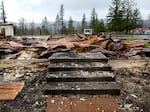
A map illustrating the location of 911 calls reporting power line problems with blue dots in and around the town of Gates on Sept. 7, 2020 relative to the heat map location of the Beachie Creek Fire in Willamette National Forest.
MacGregor Campbell / OPB
The lawyers representing a group of Oregonians suing PacifiCorp are fighting a battle on two fronts.
The first is at the ongoing trial at the Multnomah County Courthouse: 17 named plaintiffs representing residents from across Western Oregon are suing the parent company of Pacific Power for its alleged role in the 2020 Labor Day fires. They say the electric utility’s failure to properly prepare for a wind storm and dry conditions led to sparking power lines and major fires that destroyed their homes.
The second battle has been taking place behind the scenes as plaintiffs’ attorneys filed a motion to sanction PacifiCorp that alleged the corporation has actively hidden key evidence. Multnomah County Circuit Court Judge Steffan Alexander ultimately denied that motion, saying the plaintiffs’ attorneys had not proven the existence of that evidence.
Still, the focus on the utility executives’ decisions during the Labor Day fires is notable as the trial nears the end of its third week, and plaintiffs seek to portray the company as unrepentant about potentially thousands of destroyed properties in the class action case.
The plaintiffs’ attorneys have kept the top leaders at PacifiCorp and Pacific Power in their cross hairs from the start. Through expert witness testimony from veteran workers in the utility industry, they’re trying to make the case that the fires weren’t just the result of a few mistakes made on a hot, windy day, but evidence of larger systemic problems at Pacific Power.
Vincent Oatis, a retired senior lead manager for Southern California Edison’s vegetation program, testified for the plaintiffs May 1. They asked him to evaluate PacifiCorp’s tree trimming operation and the budget it put behind the effort.
His evaluation was unsparing. Oatis told jurors PacifiCorp’s vegetation executives were unqualified to do their jobs, deferred important work because the company wouldn’t allocate enough resources toward vegetation management and failed to heed critical warnings from the state.

Sam Drevo walks through wildfire damage in September 2020 in the town of Gates, Oregon, where he owned a home and river guide business.
Tyler Westfall
Oatis was especially incredulous about 2019 and 2020 state audits PacifiCorp received that called the company’s lack of vegetation management “disturbing.”
“Quite frankly, I probably would have been fired,” Oatis said when asked what would have happened if he received that letter during his working days. “I would have probably lost my job.”
When asked to rate PacifiCorp’s handling of the 2020 fires, Oatis was blunt.
“On a scale of one to 10, simply put, I’d give them a two,” he said.
Edward LaBranch, a retired electrician who ended his three-decade career at the Sacramento Municipal Utility District in California as the director of transmission and distribution, was another expert witness put forward by the plaintiffs. Attorneys asked him to review PacifiCorp’s electrical operations overall and during the days of the fires.
“There was a failure and an absence of leadership,” he said on the stand, specifically calling out high-ranking PacifiCorp executives Erik Brookhouse and David Lucas.
PacifiCorp decided against depowering lines as heavy winds battered western Oregon and some lines kept re-energizing even as they began to fault. LaBranch said PacifiCorp leaders needed to be more proactive in preventing fire risk.
“Our slogan was, ‘Keep the lights on,’” LaBranch said, referring to his former employer. “But it’s not at any cost.”
The defense often pushed back against the expert witnesses, pointing out that they had been paid by the plaintiffs and didn’t always have the full context of the situation beyond what attorneys provided them.
Motion to sanction denied
PacifiCorp won a notable victory Tuesday, as the judge overseeing the case turned down a request to sanction the company. The plaintiffs’ attorneys had alleged the corporation had withheld three records surrounding a Sept. 7, 2020 call between top PacifiCorp officials and Oregon government officials: a voicemail left on Lucas’ phone by another PacifiCorp executive, a text message about transmission lines starting fires and a digital calendar invitation to the meeting with the governor’s office. Defense attorney Ellen Kenney wrote that PacifiCorp couldn’t find the records the plaintiffs were seeking.
“Despite a diligent search, Pacific Power has not been able to locate these documents, likely because they never in fact existed,” she wrote.

Remains of the devastation from the 2020 Beachie Creek Fire are evident in the small town of Gates, Feb. 26, 2021.
Kristyna Wentz-Graff / OPB
Judge Alexander said in his ruling that the plaintiffs hadn’t proven the documents existed and that their arguments did “not sufficiently change” an April ruling on the matter that allowed the plaintiffs to conduct more interviews while the trial is ongoing.
“The presentation regarding evidence to support PacifiCorp’s willful bad faith or fault conduct as it relates to the call, it’s cumulative of the court’s initial finding on April 21,” Alexander said at the trial. “The court has already made that finding.”
Regardless of the outcome of the case, Pacific Power’s fire preparedness will remain an important topic as Oregon continues to become warmer and drier. While the fires at the center of the lawsuit happened in the Santiam Canyon, the coast and Southern Oregon, Pacific Power serves customers across the state, including parts of Portland, Central Oregon, the Columbia River Gorge and Eastern Oregon.
The case could also have legal ramifications for PacifiCorp beyond the millions of dollars on the line in this lawsuit. The Portland Business Journal recently reported that winegrowers are considering a lawsuit against the utility for smoke damage to their grape crops caused by the Labor Day fires. One of the vineyard owners behind the effort said one of their motivating factors was Pacific Power’s decision to keep power running during the windstorm.
The trial is expected to run through early June.
Correction: This story initially failed to report Judge Steffan Alexander’s ruling on the plaintiffs’ motion to sanction PacifiCorp. OPB regrets the error.


